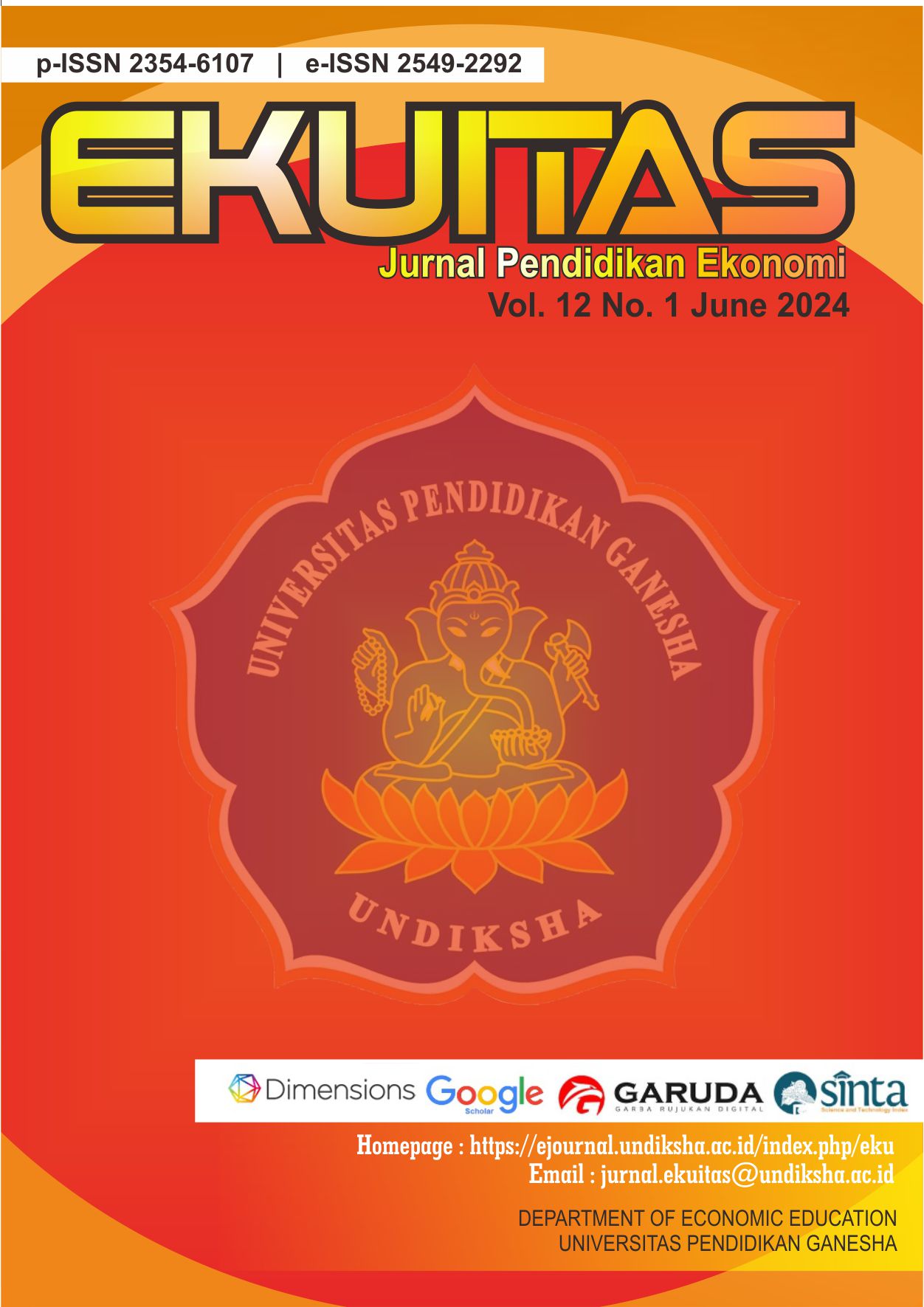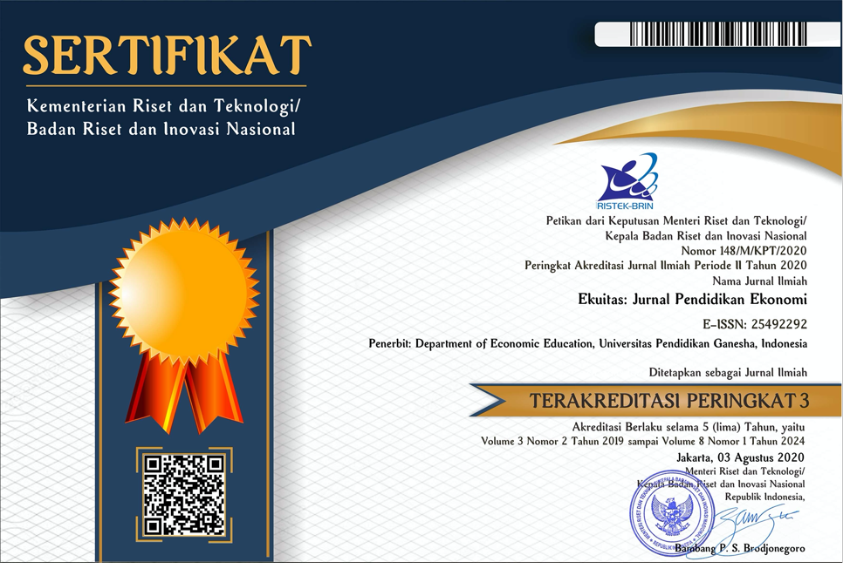Tackling the Future: Optimizing TVET Students of Employability Skills Through Self-Regulated Learning and Self-Efficacy
DOI:
https://doi.org/10.23887/ekuitas.v12i1.77092Keywords:
employability skills, self-regulated learning, self-efficacyAbstract
This article aims to dig deeper, analyzing the positive impact of applying Self-Regulated Learning (SRL) and Self-Efficacy (SE) on the development of students' employability skills in the vocational education environment. This research is quantitative research with a comparative causal approach; data collection was carried out with a survey approach through online forms on 202 students in vocational education expertise programs accounting and financial institutions (AFI), motorcycle engineering and business (MEB), automotive light vehicle engineering (ALVE), computer and network engineering (CNE) at four vocational schools in East Java. The research applies a closed questionnaire consisting of five options on the Likert scale. The respondents are voluntary and anonymous. The analysis testing is applied with SPSS analytical tool to answer the research hypothesis. The results showed that SRL and SE contribute simultaneously to shaping students' career readiness, with SRL influencing self-management and independent learning abilities. In contrast, SE motivates and strengthens confidence to apply these skills in the context of work.
References
Ali Muhidin, S. 2019. Determinant Factors Of Teacher Performance And Students’ Competency. Jurnal Pendidikan Bisnis dan Manajemen 5(1): 22–35.
Amelia, D.R. & Setyonaluri, D. 2020. Lulusan Pendidikan Vokasi dan Probabilitas Bekerja di Sektor Intensitas Digital Tinggi. Jurnal Kebijakan Ekonomi 15(1): 1–16.
Andriyani, E., Muhaimin, M. & Syaiful, S. 2021. Pengaruh Model Self Regulated Learning dan Discovery Learning terhadap Kemampuan Berpikir Kreatif Matematis. Edumatica : Jurnal Pendidikan Matematika 11(03): 54–64.
Anthonysamy, L., Koo, A.C. & Hew, S.H. 2020. Self-regulated learning strategies in higher education: Fostering digital literacy for sustainable lifelong learning. Education and Information Technologies 25(4): 2393–2414.
Australian Chamber of Commerce and Industry. 2004. Employability skills : final report : development of a strategy to support the universal recognition and recording of employability skills ; a skills portfolio approach.
Baier, F., Decker, A.-T., Voss, T., Kleickmann, T., Klusmann, U. & Kunter, M. 2019. What makes a good teacher? The relative importance of mathematics teachers’ cognitive ability, personality, knowledge, beliefs, and motivation for instructional quality. British Journal of Educational Psychology 89(4): 767–786.
Braad, E., Degens, N., Barendregt, W. & IJsselsteijn, W. 2022. Improving metacognition through self-explication in a digital self-regulated learning tool. Educational Technology Research and Development 70(6): 2063–2090.
Chen, J. 2022. The e ectiveness of self-regulated learning ( SRL ) interventions on L learning achievement , strategy employment and self-e cacy : A meta-analytic study. Frontiers in Psychology(28 October 2022).
Chen, J., Zhang, L.J. & Chen, X. 2022. L2 learners’ self-regulated learning strategies and self-efficacy for writing achievement: A latent profile analysis. Language Teaching Research: 1–22.
Chen, Y.L. & Hsu, C.C. 2020. Self-regulated mobile game-based English learning in a virtual reality environment. Computers and Education 154(April): 103910.
Coolican, H. 2018. Research Methods and Statistics in Psychology. Seventh Ed. Routledge: United State.
Čopková, R. 2021. Burnout syndrome and dark triad at schools: Engineers as teachers of vocational technical subjects. Journal on Efficiency and Responsibility in Education and Science 14(3): 195–203.
Demirören, M., Turan, S. & Teker, G.T. 2020. Determinants of self-regulated learning skills: The roles of tutors and students. Advances in Physiology Education 44(1): 93–98.
Dodourova, M., Clarkin, J.E. & Lenkei, B. 2020. The die is cast: Brexit’s influence on student career intentions. Studies in Higher Education 45(3): 648–664.
Febriantoa, P.T., Arianto, F., Kurniawan, D. & Subastian, E. 2023. Pembelajaran untuk Meningkatkan Self Regulated Learning dan Self Efficacy dalam Membentuk Profil Pelajar Pancasila. … Nasional Inovasi dan ….
Flanagan, A.M., Cormier, D.C. & Bulut, O. 2020. Achievement may be rooted in teacher expectations: examining the differential influences of ethnicity, years of teaching, and classroom behaviour. Social Psychology of Education 23: 1429–1448.
Ghozali, I. 2018. Aplikasi Analisis Multivariate dengan Program IBM SPSS 25. Edisi ke-9. Badan Penerbit Universitas Diponegoro: Semarang.
Hayes, A.F. & Darlington, Ri.B. 2017. Regression Analysis and Linear Models Methodology in the Social Sciences. THE GUILFORD PRESS.:
Herlina, M.G., Hartono, A.M. & Halim, C. 2023. The Influence of Internship and Self-efficacy on Work Readiness among Higher Education Students in Jakarta: 1645–1651.
Ismoyo, A.G. & Wahjudi, E. 2023. Dapatkah Efikasi Diri Memediasi Pengaruh Kompetensi Kejuruan Terhadap Kesiapan Kerja Siswa di Bidang Akuntansi ? Jurnal Pendidikan Akuntansi (JPAK) 11(2): 198–210.
Kline. 2011. Principles and Practice of Structural Equation Modeling (3rd editio). The Guildford Press: New York.
Kuonen, D. 2004. Regression modeling strategies: with applications to linear models, logistic regression, and survival analysis. Statistical Methods in Medical Research, hlm.
Lianto, L. 2019. Self-Efficacy: A Brief Literature Review. Jurnal Manajemen Motivasi 15(2): 55.
Lubis, A. & Khairani. 2021. The Relationship Between Self Efficacy and StudentWorkReadiness in Vocational High Schools. Jurnal Neo Konseling 3(2): 165–172.
Moghadari-Koosha, M., Moghadasi-Amiri, M., Cheraghi, F., Mozafari, H., Imani, B. & Zandieh, M. 2020. Self-efficacy, self-regulated learning, and motivation as factors influencing academic achievement among paramedical students a correlation study. Journal of Allied Health 49(3): 145E-152E.
Muliasa, A.A.C. & Wrahatnolo, T. 2023. Pengaruh Keterampilan Praktik dan Self-Efficacy Terhadap Kesiapan Kerja Siswa Kompetensi Keahlian Teknik Instalasi Tenaga Listrik SMK Negeri 2 Surabaya. JVTE: Journal of Vocational and Technical Education 5(2): 233–240.
Nabavi, R.T. & Bijandi, M.S. 2012. Bandura ’ s Social Learning Theory & Social Cognitive Learning Theory Razieh Tadayon Nabavi. Theories of Developmental Psychology(January 2012): 24.
Nastasia, K., Akhmad Tarigan, B. & Mary, H. 2022. The Relationship Between Confidence And Working Readiness Of Students In The City Of Padang. Enrichment: Journal of Management 12(2): 2305–2311.
Nguyen, H.L. 2023. Individual stories of agency: an exploratory study into the pandemic impact on students’ employability skills. Higher Education, Skills and Work-based Learning.
Nuryanto, M. 2020. Studi Korelasional: Status Identitas Vokasional Dan Kesiapan Kerja Siswa SMK Kesehatan Kota Salatiga. IJIP : Indonesian Journal of Islamic Psychology 2(1): 62–83.
Permana, A.Y., Fitriani & Aulia, T. 2023. Analysis of Students’ Work Readiness Based on Self-Efficacy of Vocational High School in The Building Information Modelling Technology Era. Journal of Technical Education and Training 15(1): 192–203.
Pravesti, C.A., Mufidah, E.F., Farid, D.A.M. & Lathifah, M. 2022. Pentingnya Self-Regulated Learning pada Mahasiswa. Prosiding Seminar Nasional Hasil Riset dan Pengabdian, hlm. 8–18.
Rachmawati, A.D. & Kusumah, Y.S. 2023. Evaluation of Industrial Work Practice Program in Vocational High School 1 Rejotangan. Jurnal Pendidikan Vokasi 13(1): 60–68.
Rahman, D.F. 2022. 10% Lulusan SMK Menganggur pada Februari 2022. Databoks, hlm.
Rahmi, T.N. & Safitri, S. 2023. Psychological Capital and Academic Procrastination: The Mediating Role of Self-Regulated Learning among College Students. Journal of Educational, Health and Community Psychology 1(2): 275.
Rashidi, S.N., Majid, F.A. & Hashim, H. 2023. Exploring the Mediating Role of Students ’ Satisfaction Towards Personal Record Building in the Influence of Self-regulated Learning Strategies on Employability Skills. Asian Journal of University Education (AJUE) 19(3): 676–689.
Saadati, Z., Zeki, C.P. & Vatankhah Barenji, R. 2023. On the development of blockchain-based learning management system as a metacognitive tool to support self-regulation learning in online higher education. Interactive Learning Environments 31(5): 3148–3171.
Sari, N., Sarjana, K., Turmuzi, M. & Hayati, L. 2023. Analisis Hubungan Self-Regulated Learning Dengan Prestasi Belajar Siswa. Journal of Classroom Action Research 5(Special Issue): 269–278.
Satrio, Y.D. & Sahid, S. 2023. The interplay of TPACK, self-efficacy, and career motivation among economics teachers: a mediation analysis 2334(March): 125–141.
Schunk, D.H. & J.Zimmerman, B. 2008. Motivation and Self-Regulated Learning Theory, Research, and Applications. Taylor & Francis.:
Taranto, D. & Buchanan, M.T. 2020. Sustaining Lifelong Learning: A Self-Regulated Learning (SRL) Approach. Discourse and Communication for Sustainable Education 11(1): 5–15.
Theobald, M. 2021. Self-regulated learning training programs enhance university students’ academic performance, self-regulated learning strategies, and motivation: A meta-analysis. Contemporary Educational Psychology 66(May): 101976.
Tur, G., Castañeda, L., Torres-Kompen, R. & Carpenter, J.P. 2022. A literature review on self-regulated learning and personal learning environments: features of a close relationship. Interactive Learning Environments 26(October): 1–20.
Wang, D., Guo, D., Song, C., Hao, L. & Qiao, Z. 2022. General Self-Efficacy and Employability Among Financially Underprivileged Chinese College Students: The Mediating Role of Achievement Motivation and Career Aspirations. Frontiers in Psychology 12(January): 1–11.
Widiatmoko, M. & Herlina, I. 2021. Studi Deskriptif Profil Self-Regulated Learning Siswa. Jurnal Selaras : Kajian Bimbingan dan Konseling serta Psikologi Pendidikan 4(1): 9–16.
Wijanarka, B.S., Wijarwanto, F. & Mbakwa, P.N. 2023. Successful implementation of teaching factory in machining expertise in vocational high schools. Jurnal Pendidikan Vokasi 13(1): 1–13.
Zainudin, A. 2014. A Handbook on SEM: for Academicians and Practitioners. MPWS Rich Resources.:
Zhao, Y., Li, L., Zhang, X., Zhang, Y. & Li, H. 2019. How teacher emotional labor influences burnout: The mediating role of psychological empowerment.
Downloads
Published
How to Cite
Issue
Section
License
Copyright (c) 2024 Yeni Lestari

This work is licensed under a Creative Commons Attribution-ShareAlike 4.0 International License.








